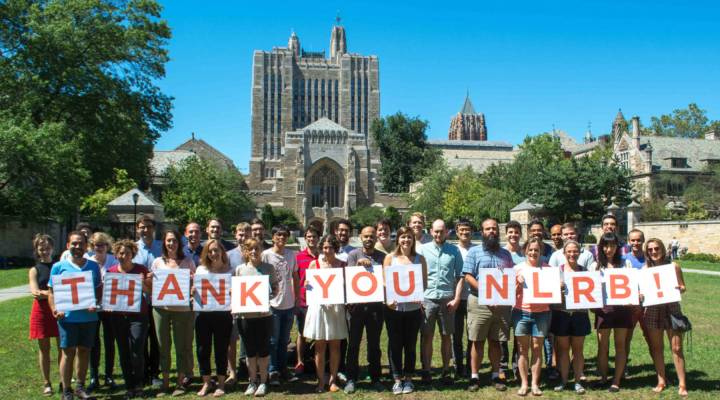
Graduate students win recognition as employees

Colleges and universities are still absorbing the news of a ruling Tuesday by the National Labor Relations Board. The board voted 3-1 that graduate student research and teaching assistants at Columbia University are employees and have the right to unionize. Grad student unions have been recognized at many public universities since 1969. Among private schools, just New York University voluntarily recognizes a student union.
At Yale University, grad students have been bargaining informally for years. They’ve won health insurance, domestic partner benefits and teacher training, according to organizers.
Yesterday’s ruling paves the way to formal collective bargaining, said Aaron Greenberg, a PhD candidate in political science and chair of Local 33-UNITE HERE, Yale’s graduate student employee union.
“We are really excited,” he said. “This is a historic decision that is going to affect tens of thousands of graduate employees across the country.”
Grad students have become a ‘go-to’ source of cheap labor for universities, and they’re doing more of the teaching and research.
Less than a third of college instructors today are tenured professors, said Gordon Lafer, a former grad student organizer who now teaches labor policy at the University of Oregon.
That’s been a double-edged sword for people pursuing doctoral degrees, he said.
“On the one hand you are the low wage labor force while you’re doing your Ph.D., whether that’s in teaching or research,” he said. “On the other hand, when you get out you have less chance of getting a real tenure-track job because so many of those have been replaced by graduate students and part-timers.”
Colleges argue the ruling could decrease work opportunities for all students on campus, including undergraduates doing federal work-study jobs.
The NLRB decision suggests any students with campus jobs, not just graduate students, have the right to organize, said Peter McDonough, general counsel of the American Council on Education.
“The floodgates essentially are open,” he said. “The opportunity exists for every person who is an employee, whether a student or not, on a campus, to be represented.”
Union representation itself isn’t bad, he said, but it is likely to increase labor and administrative costs, which he said, will be passed on to students.
There’s a lot happening in the world. Through it all, Marketplace is here for you.
You rely on Marketplace to break down the world’s events and tell you how it affects you in a fact-based, approachable way. We rely on your financial support to keep making that possible.
Your donation today powers the independent journalism that you rely on. For just $5/month, you can help sustain Marketplace so we can keep reporting on the things that matter to you.












